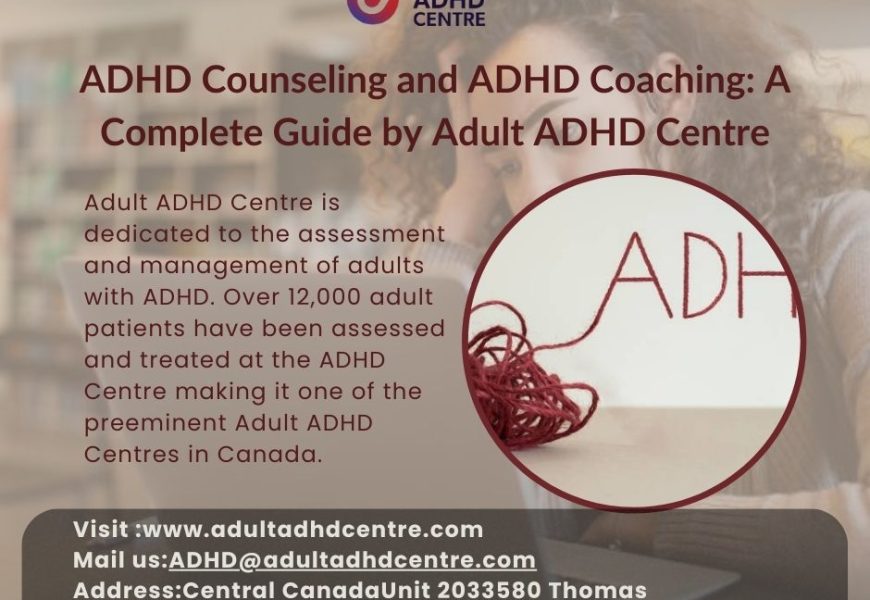Introduction
ADHD, or Attention-Deficit/Hyperactivity Disorder, is widely discussed in relation to children, but it’s also highly prevalent in adults. For many adults, ADHD poses unique challenges, affecting their work, relationships, and daily routines. Navigating adult responsibilities while managing ADHD symptoms can be overwhelming, making professional guidance vital for living a balanced life. That’s where ADHD counseling and ADHD coaching come into play.
What is ADHD Counseling?
ADHD counseling is a therapeutic approach tailored to help individuals understand and manage their ADHD symptoms. Counseling provides a supportive environment to address emotional and behavioral challenges, explore the roots of personal struggles, and find effective coping mechanisms.
The Goals of ADHD Counseling
The main objectives of ADHD counseling include:
- Addressing emotional distress related to ADHD symptoms.
- Helping individuals build effective coping skills.
- Enhancing personal relationships through better communication strategies.
- Empowering clients to feel more confident in managing their lives.
Types of ADHD Counseling Therapies
Various therapies in ADHD counseling can help reduce the impact of symptoms. Some popular methods include Cognitive Behavioral Therapy (CBT), which focuses on adjusting thought patterns and behaviors, and psychoeducation, which increases self-awareness and understanding of ADHD.
ADHD Coaching: A Practical Approach
Unlike traditional counseling, ADHD coaching is a forward-focused, goal-oriented process. An ADHD coach works with individuals to help them develop specific strategies for dealing with ADHD in day-to-day scenarios.
Difference Between ADHD Counseling and ADHD Coaching
While counseling often centers on the emotional and psychological aspects of ADHD, coaching focuses on practical aspects. Coaches provide a structured approach to help clients achieve their goals, stay organized, and build productive habits.
How ADHD Coaching Works
ADHD coaching usually involves setting personal objectives, identifying obstacles, and developing action plans. Coaches act as accountability partners, encouraging clients to remain on track while offering tools to manage daily life effectively.
Benefits of ADHD Counseling
Emotional Support and Guidance
ADHD counseling offers a safe space for clients to share their frustrations and concerns without judgment. This emotional support is crucial for alleviating feelings of isolation and anxiety.
Improving Coping Mechanisms
Learning how to manage impulsivity, distractibility, and hyperactivity in social and professional situations can greatly improve an individual’s quality of life.
Better Communication and Relationships
ADHD counseling promotes clearer communication skills, enabling clients to express themselves effectively, improving their relationships with family, friends, and coworkers.
Benefits of ADHD Coaching
Setting and Achieving Goals
With ADHD coaching, clients learn to define realistic goals and work systematically towards achieving them. This skill helps boost their sense of accomplishment.
Building Self-Discipline
ADHD coaching emphasizes consistency, helping individuals develop habits that foster self-discipline and responsibility.
Enhancing Daily Life Skills
Coaching equips clients with essential life skills, like time management, organization, and prioritization—essential tools for thriving in both personal and professional domains.
How Adult ADHD Centre Can Help
The Adult ADHD Centre specializes in services that are specifically tailored for adults with ADHD. Their experienced professionals offer a holistic approach, combining the benefits of both counseling and coaching to help clients manage symptoms and achieve personal goals.
Specialized Counseling Services
Their counseling sessions target the emotional and psychological effects of ADHD, providing clients with a comprehensive understanding of their condition.
Personalized ADHD Coaching Programs
Adult ADHD Centre’s coaching programs are highly customized to cater to individual needs, focusing on practical methods to improve daily functioning.
Comprehensive Assessment and Diagnosis
A thorough assessment ensures a clear diagnosis, forming a strong foundation for both counseling and coaching plans.
When to Seek ADHD Counseling vs. ADHD Coaching
Signs You Need ADHD Counseling
If ADHD symptoms are causing emotional distress, affecting mental health, or straining relationships, counseling may be the better option.
Indicators for Choosing ADHD Coaching
Coaching is ideal for individuals who struggle with organization, time management, or achieving personal or professional goals due to ADHD.
Can You Combine ADHD Counseling and Coaching?
Absolutely. Combining both can offer a balanced approach, addressing both emotional needs and practical skills, leading to a well-rounded support system.
Methods Used in ADHD Counseling
Cognitive Behavioral Therapy (CBT)
CBT helps clients reframe negative thinking patterns, encouraging them to approach life with a more constructive outlook.
Mindfulness and Relaxation Techniques
These techniques improve concentration and reduce stress, helping clients stay grounded and focused.
Psychoeducation for Understanding ADHD
Knowledge is power. Psychoeducation helps individuals understand their ADHD better, fostering acceptance and self-compassion.
Techniques Employed in ADHD Coaching
Time Management and Organization Skills
These skills are essential for building a structured and less chaotic lifestyle, allowing individuals to handle responsibilities efficiently.
Goal Setting and Accountability
An ADHD coach helps clients set achievable goals and offers accountability, which can motivate clients to stay committed to their progress.
Task Prioritization and Focus Strategies
ADHD coaching also teaches clients how to prioritize tasks and focus on one thing at a time, improving productivity.
Common Challenges in ADHD Counseling and Coaching
Dealing with ADHD requires understanding individual symptoms and preferences. A significant challenge is fostering trust and comfort with a coach or counselor. It’s essential to choose a professional who makes clients feel at ease.
Tips for Maximizing ADHD Counseling and Coaching Sessions
- Prepare for Each Session
- Be Open and Honest with Your Counselor or Coach
- Practice Patience and Persistence
The Role of Family and Friends in ADHD Support
Having a solid support system is invaluable for managing ADHD. Family and friends play a significant role in encouraging counseling or coaching, offering emotional support, and helping with accountability.
ADHD Management Strategies Beyond Counseling and Coaching
In addition to professional guidance, lifestyle changes, such as a balanced diet, regular exercise, and mindfulness, can significantly help in managing ADHD symptoms.
Conclusion
ADHD counseling and coaching each serve distinct roles in helping adults manage ADHD symptoms effectively. Whether you seek emotional support through counseling or practical guidance with coaching, Adult ADHD Centre offers specialized services tailored to adult needs. With the right resources, adults with ADHD can lead fulfilling, successful lives.
Frequently Asked Questions (FAQs)
- What is the difference between ADHD counseling and coaching?
Counseling focuses on emotional support, while coaching offers practical tools and strategies. - Can ADHD counseling and coaching be combined?
Yes, combining both can provide a holistic approach to ADHD management. - How long do ADHD counseling and coaching sessions typically last?
Sessions typically last between 45 minutes to an hour. - Are there online options for ADHD counseling and coaching?
Many providers, including Adult ADHD Centre, offer online options for convenience. - What should I expect in my first ADHD counseling or coaching session?
Expect a welcoming introduction, an assessment, and the development of an initial plan for your needs.









